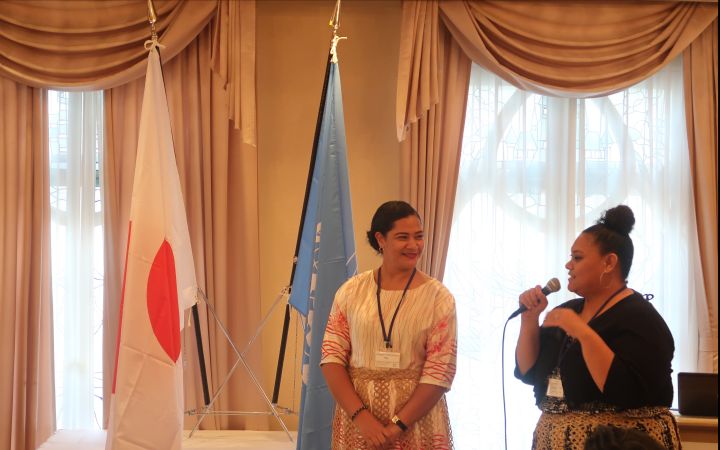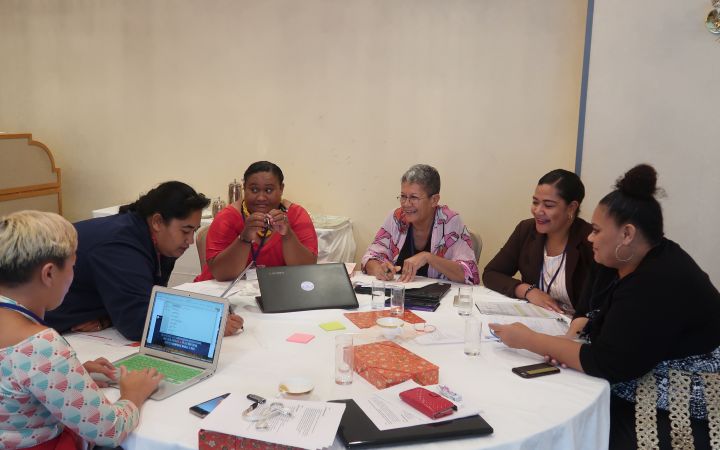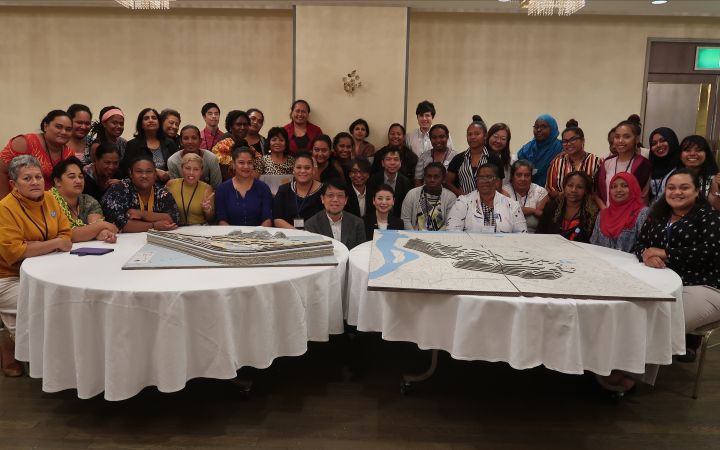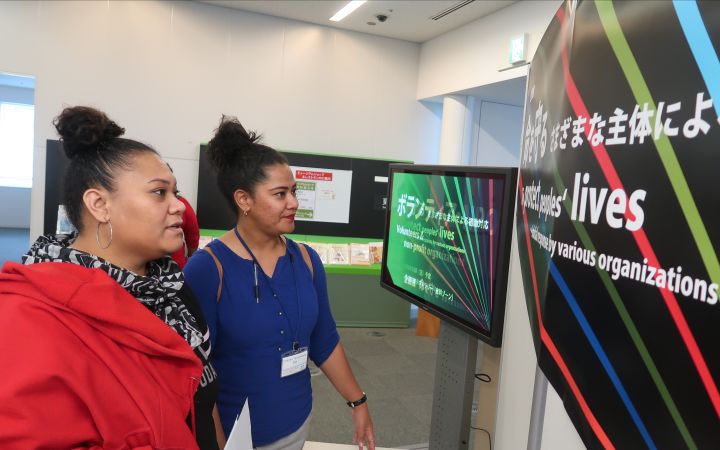- Lavinia Taumoepeau-Latu was the first safety and protection cluster coordinator for Tonga. In 2018, she participated in the UNITAR Women’s Leadership on Tsunami-based Disaster Risk Reduction Training Programme.
- The UNITAR programme introduced Lavinia to disaster risk reduction principles and continues to be the foundation on which she builds her work in disaster management.
- UNITAR featured Lavinia's work in developing standards for Tonga and fostering the community-government relationship. She updates us on what she's been working on since then.
23 August 2024, Hiroshima, Japan - Tonga is no stranger to tsunamis, cyclones and the devastation they cause. Lavinia Taumoepeau-Latu, a Tongan American, feels a strong calling to ensure her homeland is better prepared for such events through disaster management training and education.
In May 2018 – freshly appointed as the safety and protection cluster coordinator of Tonga at the National Emergency Management Office (NEMO) – Lavinia took part in the UNITAR Women’s Leadership on Tsunami-based Disaster Risk Reduction Training Programme, which brought her to Japan. Six years later, Lavinia continues to pursue her passion to help the people of Tonga better prepare for disasters.
FINDING HER AHA MOMENT AT THE UNITAR PROGRAMME
The UNITAR disaster risk reduction programme, supported by the Government of Japan, trains women from small island developing states on leadership in disaster risk reduction. The 2018 round was the first time Lavinia learned about disaster risk reduction principles and the Sendai Framework for Disaster Risk Reduction, a major agreement that provides UN member states with concrete actions to protect development gains from the risk of disaster.
It was my first time being exposed to disaster risk reduction principles and standards of what humanitarian actors are focused on, the Sustainable Development Goals within the government, how it connects and aligns to the Sendai Framework... that was my training and aha moment.” —Lavinia Taumoepeau-Latu, disaster management professional and UNITAR alumna (Tonga)
The UNITAR learning helped Lavinia better position herself as Tonga’s first safety and protection cluster coordinator and lay the groundwork for her successors. After returning from the UNITAR training, mindful of what she learned and inspired by other women from her cohort, Lavinia helped establish standard operating procedures, terms of reference and a code of conduct for disasters that serve as examples for other clusters in Tonga.
THE UNITAR-INSPIRED TRAINING CURRICULUM
Lavinia has always felt strongly about empowering Tongans at the community level, as local-level risk reduction is crucial when it comes to tackling disasters like tsunamis.
Returning to the United States in 2020 for family reasons, Lavinia pursued a master’s degree in international emergency and disaster management and won a scholarship to develop a culturally relevant training curriculum for district and town officers in Tonga. She spent a year in Tonga to get feedback from the officers and community members so that the curriculum would be effective for Tonga’s cultural context.
Lavinia traces her work today to the foundations laid at the UNITAR training.
I feel my time at UNITAR laid out the path and inspired me to look at tsunami and disaster management in that way.” —Lavinia Taumoepeau-Latu, disaster management professional and UNITAR alumna (Tonga)
The training curriculum for district and town officers has finally been made official and is being translated into Tongan. It is expected that the curriculum will be reviewed, endorsed and implemented this year.
GETTING BETTER PREPARED IN EVERYDAY LIFE
When the 2022 Hunga Tonga–Hunga Ha’apai eruption and tsunami happened, Lavinia was in the US. Far from Tonga, she found emotional support with fellow overseas Tongan alumni Sandy Siutiti Tuipulotu and Simata-e-la'ā Palu, both of whom were in Japan. The three of them planned what they could do to help their families and friends in Tonga from afar.
Some of them were just so unprepared...even those who are making decisions for disaster events are also unprepared.” —Lavinia Taumoepeau-Latu, disaster management professional and UNITAR alumna (Tonga)
When asked about what else UNITAR could do, Lavinia pointed to empowering youth. Tonga has a relatively young population, with more than one third of the population defined as youth. She recalls how dropouts and crime rates increased among youth after their everyday lives were disrupted by the 2018 Cyclone Gita. Preparing young people to be more resilient and more engaged in disaster risk reduction and providing them with timely psychosocial support are a priority when it comes to post-disaster recovery. “I think a UNITAR youth programme would be an amazing way to connect the youth”, she says.
The enduring impact of the UNITAR training programme is evident in Lavinia’s journey. UNITAR looks forward to supporting more leaders like Lavinia so they can drive lasting improvements in government policies and lay the groundwork for effective disaster risk reduction.
RELATED STORIES
Read more about UNITAR’s sustainable contribution to DRR in Tonga:
United Nations Online Volunteer Deborah Kwan Wing contributed to this article.
About Unitar
The United Nations Institute for Training and Research (UNITAR) is the UN’s specialized training institution. In 2022, UNITAR empowered over 395,000 learners worldwide, providing them with the information and skills they need for a better future. UNITAR has a strong global presence, with offices in Geneva, Hiroshima, New York, and Bonn, as well as an enormous international network.
The UNITAR Division for Prosperity offers high-quality learning and knowledge-sharing services to present and future leaders globally. The UNITAR Division for Prosperity, which focuses on adolescents and women, works with a variety of partners on a local, regional, and global scale to address growing inequities.





